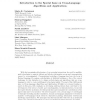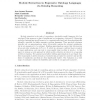JAIR
2016
9 years 10 months ago
2016
Crowdsourcing markets have emerged as a popular platform for matching available workers with tasks to complete. The payment for a particular task is typically set by the task’s ...
JAIR
2016
9 years 10 months ago
2016
Linguistic borrowing is the phenomenon of transferring linguistic constructions (lexical, phonological, morphological, and syntactic) from a “donor” language to a “recipient...
JAIR
2016
9 years 10 months ago
2016
In today’s world, we follow news which is distributed globally. Significant events are reported by different sources and in different languages. In this work, we address the ...
102
click to vote
JAIR
2016
9 years 10 months ago
2016
We describe a hybridisation strategy whose objective is to integrate linguistic resources from shallow-transfer rule-based machine translation (RBMT) into phrase-based statistical...
JAIR
2016
9 years 10 months ago
2016
How do we parse the languages for which no treebanks are available? This contribution addresses the cross-lingual viewpoint on statistical dependency parsing, in which we attempt ...
JAIR
2016
9 years 10 months ago
2016
We study the complexity of a combinatorial variant of the Shift Bribery problem in elections. In the standard Shift Bribery problem, we are given an election where each voter has ...
JAIR
2016
9 years 10 months ago
2016
JAIR
2016
9 years 10 months ago
2016
Sentiment analysis research has predominantly been on English texts. Thus there exist many sentiment resources for English, but less so for other languages. Approaches to improve ...
91
Voted
JAIR
2016
9 years 10 months ago
2016
Module extraction is the task of computing a (preferably small) fragment M of an ontology O that preserves a class of entailments over a signature of interest ⌃. Extracting modu...
192
click to vote
JAIR
2016
9 years 10 months ago
2016
Optimally solving decentralized partially observable Markov decision processes (Dec-POMDPs) is a hard combinatorial problem. Current algorithms search through the space of full hi...


